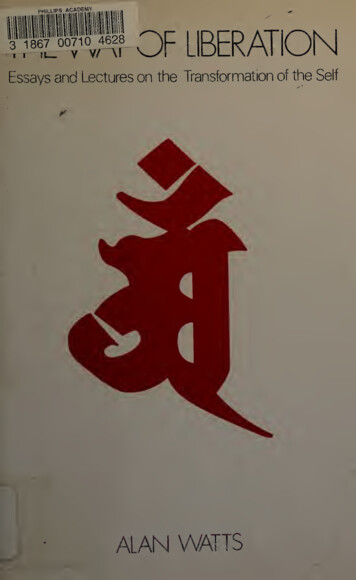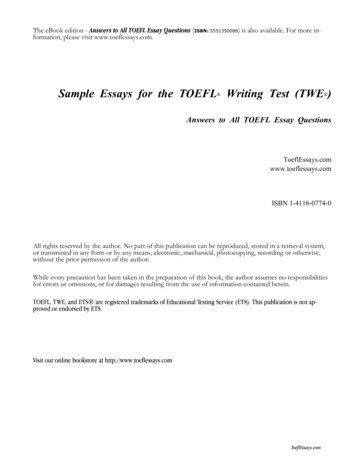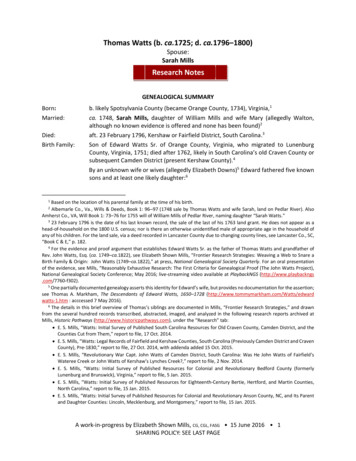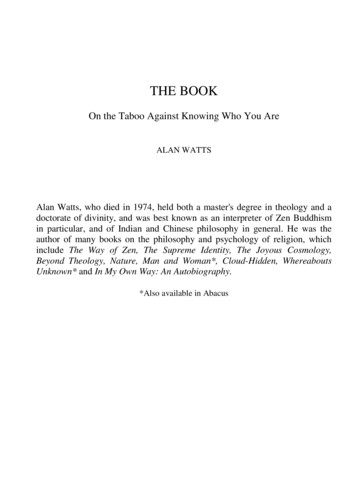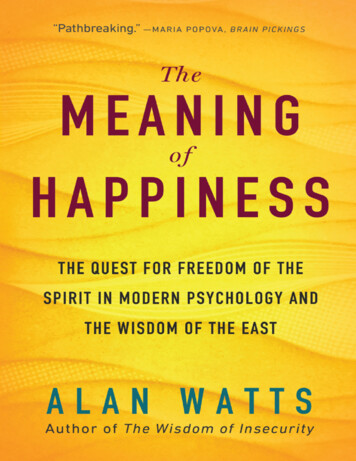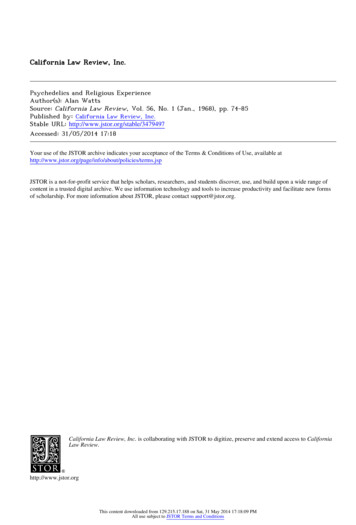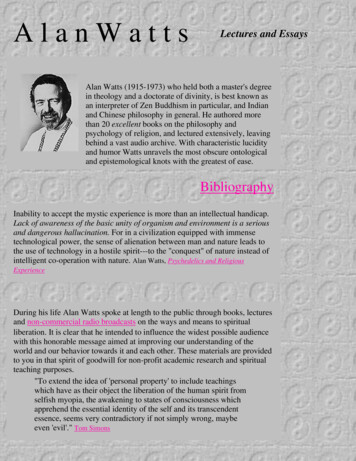
Transcription
AlanWattsLectures and EssaysAlan Watts (1915-1973) who held both a master's degreein theology and a doctorate of divinity, is best known asan interpreter of Zen Buddhism in particular, and Indianand Chinese philosophy in general. He authored morethan 20 excellent books on the philosophy andpsychology of religion, and lectured extensively, leavingbehind a vast audio archive. With characteristic lucidityand humor Watts unravels the most obscure ontologicaland epistemological knots with the greatest of ease.BibliographyInability to accept the mystic experience is more than an intellectual handicap.Lack of awareness of the basic unity of organism and environment is a seriousand dangerous hallucination. For in a civilization equipped with immensetechnological power, the sense of alienation between man and nature leads tothe use of technology in a hostile spirit---to the "conquest" of nature instead ofintelligent co-operation with nature. Alan Watts, Psychedelics and ReligiousExperienceDuring his life Alan Watts spoke at length to the public through books, lecturesand non-commercial radio broadcasts on the ways and means to spiritualliberation. It is clear that he intended to influence the widest possible audiencewith this honorable message aimed at improving our understanding of theworld and our behavior towards it and each other. These materials are providedto you in that spirit of goodwill for non-profit academic research and spiritualteaching purposes."To extend the idea of 'personal property' to include teachingswhich have as their object the liberation of the human spirit fromselfish myopia, the awakening to states of consciousness whichapprehend the essential identity of the self and its transcendentessence, seems very contradictory if not simply wrong, maybeeven 'evil'." Tom Simons
Let's talk with Alan Watts! realaudio Weekly Netcast ScheduleLecturesThese lectures are transcripts of recordings made from non-commercial radio broadcasts.They are fairly complete with some inevitable errors in spelling, grammar, and minor tapebreak omissions. Alan Watts was a higly-skilled lecturer so these files should not beconsidered acceptable substitutes for the original audio recordings. Unless you don'tunderstand english or have hearing impairment, these files can only serve as the barestintroduction to his oral talent.The subject of this seminar is "Self and Other," and this is therefore to be anexploration into the subject that interests me most, which is the problem ofpersonal identity, man's relationship to the universe, and all the things that areconnected with that. It is for our culture at this time in history an extremelyurgent problem, because of our technological power. In known history, nobodyhas had such capacity for altering the universe than the people of the UnitedStates of America, and nobody has gone about it in such an agressive way.Self and OtherI find it a little difficult to say what the subject matter of this seminar is goingto be, because it's too fundamental to give it a title. I'm going to talk about whatthere is. Now the first thing that we have to do is to get our perspectives withsome background about the basic ideas that, as Westerners living today in theUnited States, influence our everyday common sense, our fundamental notionsabout what life is about. And there are historical origins for this whichinfluence us more strongly than most people realize. Ideas of the world whichare built into the very nature of the language we use, and of our ideas of logic,and of what makes sense altogether.The Nature of ConsiousnessPart 1 and most of 2 (of 3) are also known as "What Is Reality?"
Today, serious heresy, and rather peculiarly in the United States, is a deviantstate of consciousness. Not so much deviant opinions as having a kind ofexperience which is different from "regular" experience. And as RonaldLang.has so well pointed out, we are taught what experiences are permissablein the same way we are taught what gestures, what manners, what behavior ispermissable and socially acceptable. And therefore, if a person has so-called"strange" experiences, and endeavors to communicate these experiences,because naturally one talks about what one feels, and endeavors tocommunicate these experiences to other people, he is looked at in a very oddway and asked "are you feeling all right?" Because people feel distinctlyuncomfortable when the realize they are in the presence of someone who isexperiencing the world in a rather different way from themselves. They call inquestion as to whether this person is indeed human. They look like a humanbeing but because the state of experience is so different you wonder whetherthey really are. And you get the kind of. the same kind of queasy feeling insideas you would get if, for example, you were to encounter a very beautiful girl,very formally dressed, and you were introduced, and in order to shake handsshe removed her glove and you found in your hand the claw of a large bird.That would be spooky, wouldn't it?The Value of Psychotic ExperienceThis weekend seminar is devoted to Buddhism . The center of Buddhism, theonly really important thing about Buddhism is the experience which they call'awakening.' Buddha is a title, and not a proper name. It means "awake".The World As EmptinessIt would be, of course, much better, if this occasion were celebrated with notalk at all, and if I addressed you in the manner of the ancient teachers of Zen, Ishould hit the microphone with my fan and leave. But I somehow have thefeeling that since you have contributed to the support of the Zen Center, inexpectation of learning something, a few words should be said, even though Iwarn you, that by explaining these things to you, I shall subject you to a veryserious hoax.A Lecture on Zen(aka Zen Bones)
EssaysThe undoubted mystical and religious intent of most users of the psychedelics,even if some of these substances should be proved injurious to physical health,requires that their free and responsible use be exempt from legal restraint in anyrepublic that maintains a constitutional separation of church and state. To theextent that mystical experience conforms with the tradition of genuine religiousinvolvement, and to the extent that psychedelics induce that experience, usersare entitled to some constitutional protection. Also, to the extent that researchin the psychology of religion can utilize such drugs, students of the humanmind must be free to use them. Under present laws, I, as an experienced studentof the psychology of religion, can no longer pursue research in the field. This isa barbarous restriction of spiritual and intellectual freedom, suggesting that thelegal system of the United States is, after all, in tacit alliance with themonarchical theory of the universe, and will, therefore, prohibit and persecutereligious ideas and practices based on an organic and unitary vision of theuniverse.Psychedelics and Religious ExperienceIt is said that playing-cards were devised by the ancients to hide a secret wherethose not "in the know" would never think of looking for it. For heresy-huntersare serious-minded people who would never think of looking for religion in agame. It is curious to think how men have gambled, fought and slain oneanother over these unknown symbols, and it is interesting to wonder whetherthe most accomplished 'poker face' would fall a little on discovering that hewas playing for lucre with emblems just as holy as the cross, the chalice andthe crown of thorns. Probably not, for men have done things just as terrible inthe name of symbols whose holiness they recognized. However, it is no lessstrange that the puritanic mind should see in diamonds, spades, hearts and clubsthe signs of vice, to be avoided at all times and more especially on Sundays.The Cross of CardsI wish I was there! The Houseboat Summit featuring Timothy Leary, Gary Snyder, AlanWatts and Allen Ginsberg
Network Resources Weekly Netcast Lectures! You may wish to grab a pen and paper andjot down a localized hard copy of this schedule corrected for yourtimezone. Sunday KKUP - Pacific Time WUOG - Eastern Time mornings from Midnight-1am - realaudioSaturday WGDR - Eastern Time evenings 6-7pm - realaudio or winmediaFriday KPFK - Pacific Time mornings 11-11:30pm - realaudioThursday WFMU - Eastern Time mornings from 9-9:30am - realaudioWednesday WMNF - Eastern Time nights from 11pm-Midnight - realaudioTuesday KGNU - Mountain Time mornings from 10-10:30am - realaudio8Monday KPFK - Pacific Time mornings from 7-8am - realaudiomornings from 11:30am-12:30pm - realaudio or winampAlan Watts Discussion Forum posts weekly details about upcomingnetcasts including which lectures to expect and when shows arepre-empted by fundraising or other shows. Table of Alan Watts Radio Broadcasts in U.S. CitiesAudio Alan Watts Sound Bytes at wattstapes.com Alan Watts: Real Audio at alanwatts.com
Learning the Human Game clip CBC Radio IDEAS 1974 - realaudio/index5 min Alan Watts segment begins between 32-33 minutes into this 54 minshow. Songs Joy Zipper 10. The Power Of Alan Watts - real or winmediaVan Morrison Lyrics for Alan Watts Blues Essays The New Alchemy Books The Joyous Cosmology The Book On The Taboo Against Knowing Who You AreCommunity AlanWatts.net Alan Watts Discussion Forum and Java Alan Watts ChatAlanWatts Group is a place to study and discuss the teachings of AlanWatts.Bring your wallet Mastering Enlightenments Arts reportedly provides complete versionsof Alan Watts lectures.Alan Watts Electronic University reportedly provides edited versionsof Alan Watts lectures as well as rare books, pamphlets and realaudioclips.Big Sur Tapes has rare and unusual audio and print items. Videocollection, Four by Alan Watts Hartley Film Foundation, ZEN: The Best of Alan Watts, and The Art of Meditation. Mystic Fire Video has edited videos and audio. Click 'catalog' then search for'watts'. The Pacifica Radio Archives contain several rare radio broadcasts.100 audio and video files for 2 each at infopost
This message contains information concerning the integrity of various commercialofferings of Alan Watts lectures. Unfortunately these important spiritual teachingsare subject to commercial exploitation and often edited, retitled and repackaged. Dosome research before you spend!
Alan Watts BibliographyBooksThe Spirit of Zen1936The Legacy of Asia and Western Man1939The Meaning of Happiness1940Behold the Spirit1947Easter - Its Story and Meaning1950The Supreme Identity1950The Wisdom of Insecurity1951Myth and Ritual in Christianity1953The Way of Zen1957Nature, Man, and Woman1958This Is It1960Psychotherapy East and West1961The Joyous Cosmology1962The Two Hands of God1963Beyond Theology1964The Book On the Taboo Against Knowing Who You Are1966Nonsense1967Does It Matter?1970Erotic Spirituality1971The Art of Contemplation1972In My Own Way (autobiography)1972Cloud-hidden, Whereabouts Unknown1973Tao: The Watercourse Way1975Monographs and PamphletsAn Outline of Zen Buddhism1932Seven Symbols of Life1936
The Psychology of Acceptance1939The Theological Mystica of St. Dionysius1944The Meaning of Preisthood1946Zen Buddhism1947Zen1948The Way of Liberation in Zen Buddhism1955Beat Zen, Square Zen, and Zen1956RecordsOm: The Sound of Hinduism1967Why Not Now: Dhyana, The Art of Meditation1969This bibliography doesn't include the numerous books of essays and lecturetranscripts published after his death.Alan Watts at deoxy.org
Psychedelics and ReligiousExperienceby Alan Watts1. The Psychedelic Experiencea. slowing down of timeb. awareness of polarityc. awareness of relativityd. awareness of eternal energy2. Opposition to Psychedelic Drugs(Originally appeared in the California Law Review,Vol. 56, No. 1, January 1968, pp. 74-85.) CopyrightAlan Watts & California Law Review.a. dangerb. escape from reality3. FootnotesThe experiences resulting from the use of psychedelic drugs are often described in religiousterms. They are therefore of interest to those like myself who, in the tradition of WilliamJames,[1] are concerned with the psychology of religion. For more than thirty years I havebeen studying the causes, the consequences, and the conditions of those peculiar states ofconsciousness in which the individual discovers himself to be one continuous process withGod, with the Universe, with the Ground of Being, or whatever name he may use by culturalconditioning or personal preference for the ultimate and eternal reality. We have nosatisfactory and definitive name for experiences of this kind. The terms "religiousexperience," "mystical experience," and "cosmic consciousness" are all too vague andcomprehensive to denote that specific mode of consciousness which, to those who haveknown it, is as real and overwhelming as falling in love. This article describes such states ofconsciousness induced by psychedelic drugs, although they are virtually indistinguishablefrom genuine mystical experience. The article then discusses objections to the use ofpsychedelic drugs that arise mainly from the opposition between mystical values and thetraditional religious and secular values of Western society.The Psychedelic ExperienceThe idea of mystical experiences resulting from drug use is not readily accepted in Westernsocieties. Western culture has, historically, a particular fascination with the value and virtueof man as an individual, self-determining, responsible ego, controlling himself and his worldby the power of conscious effort and will. Nothing, then, could be more repugnant to thiscultural tradition than the notion of spiritual or psychological growth through the use ofdrugs. A "drugged" person is by definition dimmed in consciousness, fogged in judgment,and deprived of will. But not all psychotropic (consciousness-changing) chemicals are
narcotic and soporific, as are alcohol, opiates, and barbiturates. The effects of what are nowcalled psychedelic (mind-manifesting) chemicals differ from those of alcohol as laughterdiffers from rage, or delight from depression. There is really no analogy between being"high" on LSD and "drunk" on bourbon. True, no one in either state should drive a car, butneither should one drive while reading a book, playing a violin, or making love. Certaincreative activities and states of mind demand a concentration and devotion that are simplyincompatible with piloting a death-dealing engine along a highway.I myself have experimented with five of the principal psychedelics: LSD-25, mescaline,psilocybin, dimethyl-tryptamine (DMT), and cannabis. I have done so, as William Jamestried nitrous oxide, to see if they could help me in identifying what might be called the"essential" or "active" ingredients of the mystical experience. For almost all the classicalliterature on mysticism is vague, not only in describing the experience, but also in showingrational connections between the experience itself and the various traditional methodsrecommended to induce it: fasting, concentration, breathing exercises, prayers, incantations,and dances. A traditional master of Zen or Yoga, when asked why such-and-such practiceslead or predispose one to the mystical experience, always responds, "This is the way myteacher gave it to me. This is the way I found out. If you're seriously interested, try it foryourself." This answer hardly satisfies an impertinent, scientifically minded, andintellectually curious Westerner. It reminds him of archaic medical prescriptionscompounding five salamanders, powdered gallows rope, three boiled bats, a scruple ofphosphorus, three pinches of henbane, and a dollop of dragon dung dropped when the moonwas in Pisces. Maybe it worked, but what was the essential ingredient?It struck me, therefore, that if any of the psychedelic chemicals would in fact predispose myconsciousness to the mystical experience, I could use them as instruments for studying anddescribing that experience as one uses a microscope for bacteriology, even though themicroscope is an "artificial" and "unnatural" contrivance which might be said to "distort" thevision of the naked eye. However, when I was first invited to test the mystical qualities ofLSD-25 by Dr. Keith Ditman of the Neuropsychiatric Clinic at UCLA Medical School, Iwas unwilling to believe that any mere chemical could induce a genuine mysticalexperience. At most, it might bring about a state of spiritual insight analogous to swimmingwith water wings. Indeed, my first experiment with LSD-25 was not mystical. It was anintensely interesting aesthetic and intellectual experience that challenged my powers ofanalysis and careful description to the utmost.Some months later, in 1959, I tried LSD-25 again with Drs. Sterling Bunnell and MichaelAgron, who were then associated with the Langley-Porter Clinic, in San Francisco. In thecourse of two experiments I was amazed and somewhat embarrassed to find myself goingthrough states of consciousness that corresponded precisely with every description of majormystical experiences that I had ever read.[2] Furthermore, they exceeded both in depth andin a peculiar quality of unexpectedness the three "natural and spontaneous" experiences ofthis kind that had happened to me in previous years.Through subsequent experimentation with LSD-25 and the other chemicals named above(with the exception of DMT, which I find amusing but relatively uninteresting), I found Icould move with ease into the state of "cosmic consciousness," and in due course became
less and less dependent on the chemicals themselves for "tuning in" to this particular wavelength of experience. Of the five psychedelics tried, I found that LSD-25 and cannabissuited my purposes best. Of these two, the latter--cannabis--which I had to use abroad incountries where it is not outlawed, proved to be the better. It does not induce bizarrealterations of sensory perception, and medical studies indicate that it may not, save in greatexcess, have the dangerous side effects of LSD.For the purposes of this study, in describing my experiences with psychedelic drugs I avoidthe occasional and incidental bizarre alterations of sense perception that psychedelicchemicals may induce. I am concerned, rather, with the fundamental alterations of thenormal, socially induced consciousness of one's own existence and relation to the externalworld. I am trying to delineate the basic principles of psychedelic awareness. But I must addthat I can speak only for myself. The quality of these experiences depends considerablyupon one's prior orientation and attitude to life, although the now voluminous descriptiveliterature of these experiences accords quite remarkably with my own.Almost invariably, my experiments with psychedelics have had four dominantcharacteristics. I shall try to explain them-in the expectation that the reader will say, at leastof the second and third, "Why, that's obvious! No one needs a drug to see that." Quite so,but every insight has degrees of intensity. There can be obvious-1 and obvious-2, and thelatter comes on with shattering clarity, manifesting its implications in every sphere anddimension of our existence.The first characteristic is a slowing down of time, a concentration in the present. One'snormally compulsive concern for the future decreases, and one becomes aware of theenormous importance and interest of what is happening at the moment. Other people, goingabout their business on the streets, seem to be slightly crazy, failing to realize that the wholepoint of life is to be fully aware of it as it happens. One therefore relaxes, almostluxuriously, into studying the colors in a glass of water, or in listening to the now highlyarticulate vibration of every note played on an oboe or sung by a voice.From the pragmatic standpoint of our culture, such an attitude is very bad for business. Itmight lead to improvidence, lack of foresight, diminished sales of insurance policies, andabandoned savings accounts. Yet this is just the corrective that our culture needs. No one ismore fatuously impractical than the "successful" executive who spends his whole lifeabsorbed in frantic paper work with the objective of retiring in comfort at sixty-five, when itwill all be too late. Only those who have cultivated the art of living completely in thepresent have any use for making plans for the future, for when the plans mature they will beable to enjoy the results. "Tomorrow never comes." I have never yet heard a preacher urginghis congregation to practice that section of the Sermon on the Mount which begins, "Be notanxious for the morrow." The truth is that people who live for the future are, as we say ofthe insane, "not quite all there"--or here: by over-eagerness they are perpetually missing thepoint. Foresight is bought at the price of anxiety, and when overused it destroys all its ownadvantages.The second characteristic I will call awareness of polarity. This is the vivid realization thatstates, things, and events that we ordinarily call opposite are interdependent, like back and
front, or the poles of a magnet. By polar awareness one sees that things which are explicitlydifferent are implicitly one: self and other, subject and object, left and right, male andfemale-and then, a little more surprisingly, solid and space, figure and background, pulseand interval, saints and sinners, police and criminals, in-groups and out-groups. Each isdefinable only in terms of the other, and they go together transactionally, like buying andselling, for there is no sale without a purchase, and no purchase without a sale. As thisawareness becomes increasingly intense, you feel that you yourself are polarized with theexternal universe in such a way that you imply each other. Your push is its pull, and its pushis your pull--as when you move the steering wheel of a car. Are you pushing it or pulling it?At first, this is a very odd sensation, not unlike hearing your own voice played back to youon an electronic system immediately after you have spoken. You become confused, and waitfor it to go on! Similarly, you feel that you are something being done by the universe, yetthat the universe is equally something being done by you-which is true, at least in theneurological sense that the peculiar structure of our brains translates the sun into light, andair vibrations into sound. Our normal sensation of relationship to the outside world is thatsometimes I push it, and sometimes it pushes me. But if the two are actually one, wheredoes action begin and responsibility rest? If the universe is doing me, how can I be sure that,two seconds hence, I will still remember the English language? If I am doing it, how can Ibe sure that, two seconds hence, my brain will know how to turn the sun into light? Fromsuch unfamiliar sensations as these, the psychedelic experience can generate confusion,paranoia, and terror-even though the individual is feeling his relationship to the worldexactly as it would be described by a biologist, ecologist, or physicist, for he is feelinghimself as the unified field of organism and environment.The third characteristic, arising from the second, is awareness of relativity. I see that I am alink in an infinite hierarchy of processes and beings, ranging from molecules throughbacteria and insects to human beings, and, maybe, to angels and gods-a hierarchy in whichevery level is in effect the same situation. For example, the poor man worries about moneywhile the rich man worries about his health: the worry is the same, but the difference is in itssubstance or dimension. I realize that fruit flies must think of themselves as people, because,like ourselves, they find themselves in the middle of their own world-with immeasurablygreater things above and smaller things below. To us, they all look alike and seem to haveno personality-as do the Chinese when we have not lived among them. Yet fruit flies mustsee just as many subtle distinctions among themselves as we among ourselves.From this it is but a short step to the realization that all forms of life and being are simplyvariations on a single theme: we are all in fact one being doing the same thing in as manydifferent ways as possible. As the French proverb goes, plus ca change, plus c'est la memechose (the more it varies, the more it is one). I see, further, that feeling threatened by theinevitability of death is really the same experience as feeling alive, and that as all beings arefeeling this everywhere, they are all just as much "I" as myself. Yet the "I" feeling, to be feltat all, must always be a sensation relative to the "other"-to something beyond its control andexperience. To be at all, it must begin and end. But the intellectual jump that mystical andpsychedelic experiences make here is in enabling you to see that all these myriad I-centersare yourself--not, indeed, your personal and superficially conscious ego, but what Hinduscall the paramatman, the Self of all selves.[3] As the retina enables us to see countless
pulses of energy as a single light, so the mystical experience shows us innumerableindividuals as a single Self.The fourth characteristic is awareness of eternal energy, often in the form of intense whitelight, which seems to be both the current in your nerves and that mysterious e which equalsmc2. This may sound like megalomania or delusion of grandeur-but one sees quite clearlythat all existence is a single energy, and that this energy is one's own being. Of course thereis death as well as life, because energy is a pulsation, and just as waves must have bothcrests and troughs, the experience of existing must go on and off. Basically, therefore, thereis simply nothing to worry about, because you yourself are the eternal energy of the universeplaying hide-and-seek (off-and-on) with itself. At root, you are the Godhead, for God is allthat there is. Quoting Isaiah just a little out of context: "I am the Lord, and there is none else.I form the light and create the darkness: I make peace, and create evil. I, the Lord, do allthese things."[4] This is the sense of the fundamental tenet of Hinduism, Tat tramasi--"THAT (i.e., "that subtle Being of which this whole universe is composed") artthou."[5] A classical case of this experience, from the West, is in Tennyson's Memoirs:A kind of waking trance I have frequently had, quite up from boyhood, when Ihave been all alone. This has generally come upon me thro' repeating my ownname two or three times to myself silently, till all at once, as it were out of theintensity of the consciousness of individuality, the individuality itself seemed todissolve and fade away into boundless being, and this not a confused state, butthe clearest of the clearest, the surest of the surest, the weirdest of the weirdest,utterly beyond words, where death was an almost laughable impossibility, theloss of personality (if so it were) seeming no extinction but the only true life.[6]Obviously, these characteristics of the psychedelic experience, as I have known it, areaspects of a single state of consciousness--for I have been describing the same thing fromdifferent angles. The descriptions attempt to convey the reality of the experience, but indoing so they also suggest some of the inconsistencies between such experience and thecurrent values of society.Opposition to Psychedelic DrugsResistance to allowing use of psychedelic drugs originates in both religious and secularvalues. The difficulty in describing psychedelic experiences in traditional religious termssuggests one ground of opposition. The Westerner must borrow such words as samadhi ormoksha from the Hindus, or satori or kensho from the Japanese, to describe the experienceof oneness with the universe. We have no appropriate word because our own Jewish andChristian theologies will not accept the idea that man's inmost self can be identical with theGodhead, even though Christians may insist that this was true in the unique instance ofJesus Christ. Jews and Christians think of God in political and monarchical terms, as thesupreme governor of the universe, the ultimate boss. Obviously, it is both sociallyunacceptable and logically preposterous for a particular individual to claim that he, inperson, is the omnipotent and omniscient ruler of the world-to be accorded suitablerecognition and honor.
Such an imperial and kingly concept of the ultimate reality, however, is neither necessarynor universal. The Hindus and the Chinese have no difficulty in conceiving of an identity ofthe self and the Godhead. For most Asians, other than Muslims, the Godhead moves andmanifests the world in much the same way that a centipede manipulates a hundredlegs-spontaneously, without deliberation or calculation. In other words, they conceive theuniverse by analogy with an organism as distinct from a mechanism. They do not see it asan artifact or construct under the conscious direction of some supreme technician, engineer,or architect.If, however, in the context of Christian or Jewish tradition, an individual declares himself tobe one with God, he must be dubbed blasphemous (subversive) or insane. Such a mysticalexperience is a clear threat to traditional religious concepts. The Judaeo-Christian traditionhas a monarchical image of God, and monarchs, who rule by force, fear nothing more thaninsubordination. The Church has therefore always been highly suspicious of mystics,because they seem to be insubordinate and to claim equality or, worse, identity with God.For this reason, John Scotus Erigena and Meister Eckhart were condemned as heretics. Thiswas also why the Quakers faced opposition for their doctrine of the Inward Light, and fortheir refusal to remove hats in church and in court. A few occasional mystics may be allright so long as they watch their language, like St. Teresa of Avila and St. John of the Cross,who maintained, shall we say, a metaphysical distanc
Alan Watts (1915-1973) who held both a master's degree in theology and a doctorate of divinity, is best known as an interpreter of Zen Buddhism in particular, and Indian and Chinese philosophy in general. He authored more than 20 excellent books on the philosophy and psychology of religion, and lectured extensively, leaving behind a vast audio .
